- Home
- Hilary Wilde
Red as a Rose Page 2
Red as a Rose Read online
Page 2
Her cheeks had burned. "I'm sorry . . . I . . I thought it was my sister."
His thick fair brows had lifted again. "Indeed?" he had drawled. "It's the first time I've been mistaken for a girl."
Her face had felt as if it was on fire. "I didn't see you. I . . . I heard a step and . . ."
"Jumped to conclusions," he drawled. "Dangerous thing to do."
How stern he looked. And yet she had had the uncomfortable feeling as well that he was amused, making fun of her. He looked so strong, so disapprov-
ing, so unyielding. Yet he was very handsome. The most striking-looking man she had ever seen. She had struggled for composure, determined not to let him see how confused she felt.
"You must admit it is beautiful . . ." she said, turning to look back through the window, at the lovely countryside, still uncomfortable under his gaze.
"Of course I will admit it," he said, almost snapping the words. His fingers gripped the rail before them. "Have you ever been out of this country?" he asked unexpectedly.
Startled, she shook her head, her mouth dry.
He frowned. "Then what right have you to make such a sweeping statement?" he demanded.
Now she was sure he was mocking her. Anger drove out fear so that she could answer him. "It was not meant as a sweeping statement," she said in a rather prim, and, she hoped, dignified voice, and then spoilt the whole effect by adding: "In any case, you've no right to lecture me and . ."
How young and horribly naive it sounded, she thought miserably.
One corner of his mouth had seemed to quirk. "I would like to point out to you that I did not start this conversation . . ." he said coldly. "You spoke to me first."
Now as she stood on the deck, looking warily along in case he should still be there, Elinor could remember vividly the anger that had swept through her. She had opened her mouth and firmly closed it again, afraid she might say something childish she would
later regret, uncomfortably aware that she was no match for this sophisticated man, and then she had brushed past him, almost running down the corridor, going into their compartment, sliding the door shut. Vividly she could remember Valerie looking out through a cloud of hair—she was passing the time by experimenting with a new hair style--and saying:
"Anything worth looking at?"
And Elinor had replied. "Nothing at all." And she had sat down, opening a book, hoping Valerie would not notice her trembling hands or ask her questions. Valerie would never have described that man as not worth looking at. What would Valerie have said? The girl was afraid of no one.
With a sigh of relief—or was there a little disappointment mingled with it? Elinor saw that the man and lovely girl had vanished, so she could walk along freely. She went to the side of the boat and gazed over anxiously. Luggage was coming on board. Was theirs? Everything was noisy—cranes moving, people talking. Maybe the luggage was in the cabin—and where was Valerie? Elinor hurried below, past the purser's office, down the stairs. It was like a rabbit warren of doors with numbers on. At last she found theirs, , and opened the door. It was a pleasant cabin—but no luggage. And no Valerie . . .
For a moment, she felt apprehensive. Where was Valerie? Suppose that Valerie had made one of her lightning friendships and wandered ashore, and then the ship sailed without her? What would her sister do . . . she had no money . . . she was so young. Elinor's hand pressed against her mouth, and she
gazed around her wildly. Their luggage? What could have happened to it? Supposing it was lost—how could they manage without it? Luckily she had their passports and money with her, but . . .
She gave one last quick cursory glance round the cabin, thinking how Valerie would delight in its luxurious fittings, and then she hurried back to the promenade deck, carefully searching for her sister, gazing into the empty drawing-room, the enormous lounge where groups of people were sitting, talking, back to the deck again, just as a deep voice came over the tannoy.
She caught her breath with dismay. Everyone who was not sailing on the ship must go ashore. That meant they were sailing . . . A huge crane was slowly moving to lift away one gangway, and people began to hurry to the other. Near her were a young couple, clinging to one another. By the rail stood an elderly woman frankly weeping as she kissed two small children goodbye.
Desperately Elinor stopped an officer who was passing. "Our luggage hasn't arrived . . ." she said anxiously, gazing up into a lean brown face and blue eyes which suddenly twinkled.
"Don't worry," he said gravely. "It'll be in your cabin. We never lose luggage, only passengers."
That only made it all much worse. Suppose Valerie .. .
Elinor swung round and found herself gazing up into the face of the man she had hoped never to see again, the man she kept annoying, the man she could not forget.
"Don't panic," he drawled, staring down at her. "There's no trouble that can't be put right."
Again she had the irritating feeling that he was laughing at her. But in her fear for Valerie, she forgot to be nervous. "My sister . . ." she gasped. "She came on board before I did but I can't find her . . ."
"Is your sister the girl who was with you on the train?" he asked, drawling his words. "The pretty one with red hair?" When she nodded, his face seemed to relax and he was nearly smiling. "She's safe, having a wonderful time. You'll find her in the verandah cafe . . ." He paused. "Is that all the trouble?"
Elinor was so relieved about Valerie that for a moment she could not speak, so she shook her head. "Our . . . our luggage . . ."
He smiled, then. It gave her quite a shock to see that stern unyielding face suddenly lit up by his smile. It made him look years younger.
"Don't fuss. It'll be in your cabin. No need to panic . . ." he said and then lifted his hand as if in farewell and strode away towards the gangway.
Elinor almost fell down the stairs to the cabin, in too great a hurry to wait for the lift. And there was the luggage. Just as he had said!
She looked in the mirror. Her nose was shiny and her hair all blown about. What a sight she looked. What must he have thought of her after the beauty and elegance of the girl he had been talking to? Any-how he had gone ashore—he had just walked into her life and then walked out again.
As she carefully brushed her hair, washed her face and then powdered her nose and outlined her mouth, she let herself think briefly—and for the last time—of the man. Who was he? What did he do? He spoke in a strange way. He did not seem to be a South African . . . Why worry—she would never see him again.
In the corridor, she studied a plan of the ship and found out where the verandah café was. She stood in the doorway and stared round anxiously but there was no sign of Valerie. Could he have lied to her? Yet why should he? But he had noticed Valerie—had said she was pretty and had red hair . . .
She walked past the tables and stood by the window above the swimming pool and looked down at it and, for a moment, forgot to be worried about Valerie, realising that she had fifteen days of luxury ahead of her. Good food, meeting people, having fun. It was like a dream come true—a dream made possible by Aunt Aggie's generosity. After all, she need not have paid for them to travel first class. Valerie had been excited, suggesting that perhaps Aunt Aggie was a millionairess—she had heard there were many in Australia. There had been a warmth in Aunt Aggie's letter, also a little wistfulness, for she had said she had no children and her husband was an invalid and that she was thrilled by the thought of having two nieces to love and look after. It was wonderful to know that Aunt Aggie wanted them—that she was not doing this out of a sense of duty. That would have been unbearable... Even so, Elinor wished she could lose this feeling of
disloyalty to her mother—if only she could feel that her mother would approve of what they were doing. Yet what alternative had they?
Elinor wandered along the decks, getting glimpses of cabins through open doors, looking in at the gymnasium, climbing to the boat deck, where already a few people were playing deck
quoits. It was all so huge, so white, so exciting. But she simply must find Valerie . . .
Rounding a corner, she walked slap-bang into her sister. Valerie's red hair was all wind-blown and she looked even lovelier than usual with her green eyes shining like stars and her cheeks rosy.
Valerie grabbed Elinor's arm excitedly. "Darling —where have you been? I've been hunting the whole ship for you—I even began to wonder if you'd lost courage and left me stranded . . ." Her laugh was gay and happy. "Oh, Elinor, isn't this absolutely too wonderful for words? I just can't believe it's happening to us . . . And what do you think? I've seen the most exciting man in the whole world . . ." Her words tumbled eagerly out of her mouth. "He's just so wonderful—I could have swooned. No, honestly, darling, he really is the last word. Just to look at him makes me feel thrilled. Could it be love?"
Elinor had to laugh. "Oh, Val, what a girl you are. Last week it was Max . . ."
"But this is different . . ." Valerie said excitedly. "This is a man. Max was so young, much too young. Oh, Elinor, wait until you see him, but remember he's mine .. ."
Elinor chuckled. "I'll remember . . ." As if it mattered. As if any man would look twice at her when there was someone like Valerie around. 'Why, look, even that stern, quick-to-anger stranger had noticed that Valerie was pretty and had red hair!
There was a sudden blast from a tug and the two girls ran to the side of the ship to watch the two tugs easing the great ship out from its moorings.
"You can feel it moving . . ." Valerie said excitedly, as the wind tugged and tore at their hair, wrapping their skirts tightly round their legs. They hurried over to the shore side. People were shouting. Coloured streamers were being flung down from the ship's side.
"Look, Val . . ." Elinor said quickly, pointing to two small coloured boys who were fighting on the quay for the pennies the passengers were throwing down to them.
"We're off . . ." Valerie cried, her face radiant. "Oh, Elinor, isn't it just too wonderful?"
They stood by the rail, watching the coast slide away, looking up at the great mountain, its flat top hidden now by clouds. Elinor said a silent farewell to many things she loved dearly. She knew Valerie had no regrets at leaving, but then Valerie was very different, Valerie had not this desolate sense of disloyalty to their mother, this fear lest they be doing the wrong thing.
"Elinor . . . let's go down to our cabin. I haven't seen it yet . . ." Valerie said eagerly.
How soon Valerie lost interest in anything, Elinor thought. Valerie loved everything new. Would
she always be like that when she fell in love? What was this 'handsome, wonderful man' like? Would he prove to be horribly unsuitable?
In their cabin, Valerie swooped on a card, crying in dismay: "Oh, no, Elinor. We can't. It's out of the question . ."
Elinor had put one of her suitcases on the bed to start to unpack.
"What's wrong?" she asked cheerfully. Valerie always veered between the ecstatic and the dismayed.
"They've given us first sitting in the dining salon. We can't . . . We simply must have second sitting, Elinor," Valerie said, her voice shocked.
Elinor sat on the bed and stared at her sister. "I imagine we have to take what we're given," she said mildly. "After all, most people got on the boat in England."
Valerie was standing, stiff as a poker. "We must change it," she said firmly.
"Does it matter so much?" Elinor said, surprised.
"Does it matter?" Valerie cried in a shocked ' voice. She curled up on one of the beds, hugging her knees. "Of course it matters. You meet all the wrong people at the first sitting. Darling, be an absolute angel and go down to the dining salon and have it changed. The Chief Steward is the man to see . . ."
Elinor stared helplessly at her sister. "How do you know these things, Val?"
Valerie waved her hand vaguely. "I've been talking. I've already made some nice friends on board . . ." There was the faintest hint of defiance in her voice and Elinor stifled a sigh. How had they
drifted into such a relationship as the one Valerie always implied? Elinor had no desire to be the stern, . fun-destroying elder sister, yet sometimes Valerie . . .
"I'll try to change the sitting if you like," Elinor said now, placatingly, trying to see Valerie's side of it, wanting to please her.
Valerie nearly throttled her with a bear hug and then leapt back onto the bed again. "Angel girl," she said happily. "I knew I could count on you. Just smile sweetly and with that oddly pathetic little face of yours, you'll do the trick," she added.
Her hand on the door knob, Elinor paused, looking puzzled. "Now, what exactly do you mean," she asked, "by my oddly pathetic little face?"
Valerie was examining her nails carefully. "Golly, they need doing. What do I mean? Well, look in the glass . .. you'll see."
Elinor obeyed. She stared at her reflection worriedly. What a horrible expression. She had no desire to look "pathetic".
Could there be a more glamour-destroying word? She stared at her huge, rather mournful dark eyes, saw the way her mouth drooped at the corners, looked at her very ordinary hair style and saw how very drab she looked. It was not a happy face . . . certainly not . . . Glancing at Valerie, Elinor heard again that man's voice saying : "That pretty girl—the girl with red hair." How would he have described her? Elinor wondered. Surely—oh no, surely not—as "pathetic" !
She forced herself to smile and saw that the smile had not reached her eyes. Well, she had nothing
much to make her smile. Yet Valerie, no matter what happened, managed to be gay and laugh. Was it because they were so different—because Valerie could shrug off the day's troubles and hope for the best—or because Valerie had none of the responsibilities, because she could leave everything to her sister?
Inconsistently irritated by her sister, Elinor suggested that Valerie do some unpacking while she was gone and then hurried away, telling herself she should be ashamed. Valerie was right, she was naturally the optimistic type, and being the younger, was perfectly entitled to leave things to Elinor.
The Head Steward, apparently, was not available, and the Assistant Steward, very young, his cheeks flushed, his voice exasperated, told her patiently that he was sorry but the sittings could not be changed. There were a number of people worrying him to do it and he kept pointing out that most of the passengers had travelled from England and would object most strongly to changing their sitting.
Feeling snubbed, Elinor looked round the large room at the tables that sparkled with glass and silver. After all, what did it matter? They would make friends at no matter what sitting they sat.
Back in her cabin, she saw that Valerie had not started to unpack but was reading a letter. Valerie looked up when she heard her sister and there was an odd look on her face, as if she was not sure whether she should be pleased or sorry at what she was reading. "Look, Elinor . . ." she said, handing over the letter.
The letter was written on the ship's headed note-paper. The writing was large—big letters sprawled across the page impatiently. The ink was heavy black and the words seemed to stand out.
"Dear Miss Johnson,
I have received a letter from my old friend, Aggie King, and she tells me that you and your sister are her nieces and are going to make her home yours. She asked me to keep an eye on you and see that you enjoy yourselves. As a qart, I would be pleased if you would come to my suite at about six o'clock for cocktails so that we may meet."
It was signed C. Anderson.
"But how kind of her . . ." Elinor said, a little startled.
"Her?" Valerie asked. "I think it's a man." Elinor studied the letter again. "It could be . . . I suppose. I wonder what he is like."
Valerie curled up on the bed and began to paint the nails of one hand, the tip of her tongue protruding through her lips as she concentrated.
"Probably some elderly retired colonel," she said casually. "Or maybe a wealthy sheep-farmer . . ." she added, looking up, her eyes twinkling. "Boun
d to be pretty aged as he is a friend of Aunt Aggie's. If he is single, he might make you a good husband, Elinor . . ."
"Thank you very much," Elinor said a little curtly. "I can find my own husband, thanks . . ."
"I wonder . . ." Valerie mused. "You always look so scared when a man speaks to you."
"I do not . . ." Elinor said indignantly and began to unpack, her hands unsteady. What was the matter with Valerie today? Saying such mean things. Or maybe she was trying to be helpful—trying to tell her sister things she ought to know. Pathetic look . . . always look scared when a man speaks to you. Was it true?
Suddenly she thought of something. "Oh dear . . ." she began as she looked up in dismay. "We have to go to dinner at six-thirty .. . they refused to change the sitting. Said it was quite impossible."
Valerie waved her hand about to dry it. "Maybe we'll get so bored, we'll be glad to have an excuse to get away," she said cheerfully. "Pity we can't be changed but thanks for trying, Elinor."
"That's all right . . ." Elinor mumbled, bending over her unpacking. That was one of the sweet things about Val—she was always so grateful when you did anything to help her.
"What shall we wear . . ?" Valerie said, starting on the other hand, her face absorbed in the task. "You never dress for dinner on your first night out, but then this is a cocktail party, so we must wear something a bit smart. Bless Aunt Aggie for sending us money for clothes. She must be quite a honey."
"She seems very generous and kind . . ." Elinor commented, her voice muffled as she hung away the clothes. Even that seemed absurdly disloyal to her mother, who had hated all their father's relations.
Why? They had been unkind to her, she had said. Very, very unkind.
"I think I'll wash my hair," Valerie said suddenly. "It'll soon dry and it got pretty dirty on the train."

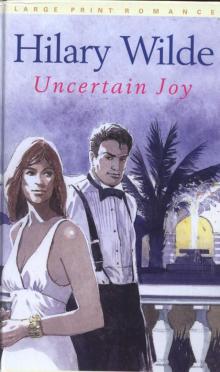 Uncertain Joy
Uncertain Joy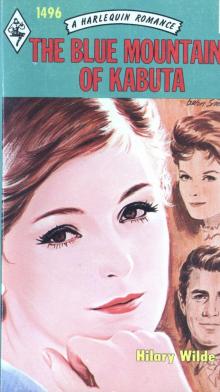 The Blue Mountains of Kabuta
The Blue Mountains of Kabuta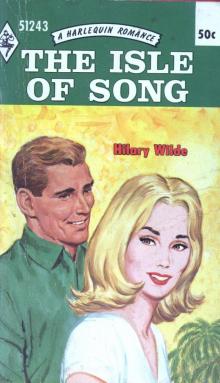 The Isle of Song
The Isle of Song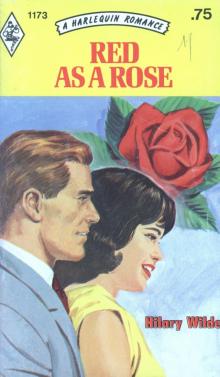 Red as a Rose
Red as a Rose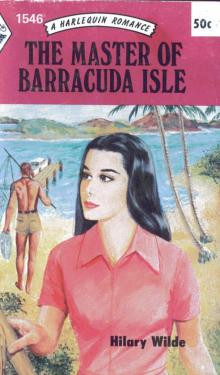 The Master of Barracuda Isle
The Master of Barracuda Isle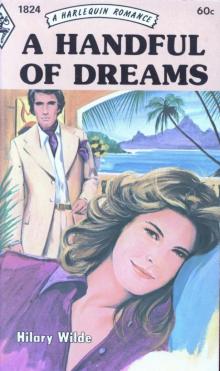 A handful of dreams
A handful of dreams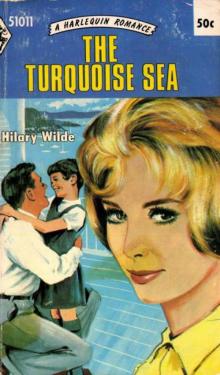 The Turquoise Sea
The Turquoise Sea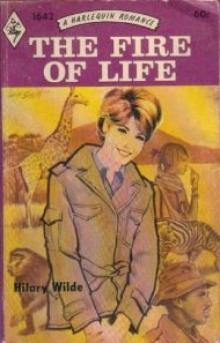 The Fire of Life
The Fire of Life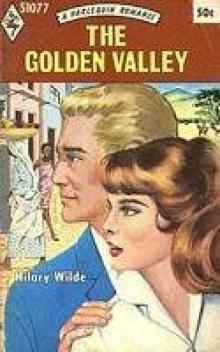 The golden valley
The golden valley The Impossible Dream
The Impossible Dream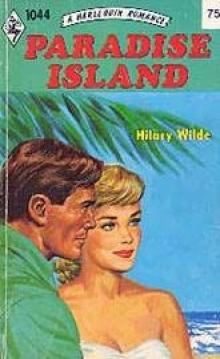 Paradise Island
Paradise Island